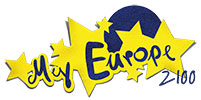Tom put his pencil down. He had been staring at the page on his table for hours and it was still almost empty. How is that possible at all? He had obtained the master’s degree in the school of political sciences in Paris, one of the best universities in Europe, he was the ambassador of the European Union in the United States and he simply could not write a simple speech about the European Union that he had to say tomorrow for the students of Harvard! All he had was the beginning of the speech that sounded: “If 90 years ago, someone had said that the arrogant French, the pedantic Germans and the hot-blooded Spanish will ever be able to live in one close community, he would have been called an absolute dreamer. However, these dreams came true!” Unfortunately, his speech finished here. Europe was such an immense and boundless notion that it would have taken hours to define it all and he only had to speak for 15 minutes.
Suddenly, he remembered the words one American friend said to him when he was still at university sixteen years ago: “Your European Union will never be able to compete with our United States. You are not one country, you speak different languages, you have different values, the poor countries of yours hate the rich ones and vice versa… You have no future!” Tom felt a sudden wish to deny it now, in his speech.
Yes, in 2014 Europe was facing many problems: the financial crisis, youth unemployment and, worst of all, a huge tide of euroscepticism – some countries, such as Great Britain, were even willing to leave the EU. Fortunately, it did not happen. It was at that time, when the European summits understood that their main task is to forge ahead the European identity in the hearts of citizens of the Union.
Many international programs were launched in order to achieve this. One of them was “Euro- Change” an initiative which provides a possibility for all the European teenagers to spend one year abroad in a family living in any other European country, studying in a local school etc. The impact of the program was unbelievable. When Tom’s son got home from his stay in Austria Tom could see that he not only became more mature as a personality, but also completely understood what it was like to be a European citizen. In addition to this, a few years ago the law was passed in the European Council and the European Parliament, claiming that a student must be able to communicate fluently in at least two foreign European languages after finishing school. In Tom’s opinion, it was a great step forward – languages give an access to the cultural treasures of other European nations which are forming the European identity too.
Even the political changes in the Europe of 2030 were really remarkable, comparing to 2014. Instead of the national Parliaments, the member states now had the legislative institutions common to the whole regions. For instance, people originating from Lithuania, Latvia and Estonia were now electing one Baltic Parliament instead of three separate Parliaments, as it was before. The same thing happened with the Nordic countries and all the others. This taught people how to live and how to rule together, how to make common decisions to reach common objectives. Perception about the common currency was different now too. If some fifteen years ago the states equated the introduction of the Euro to the absolute loss of their national identity, now they understood that the Euro did simply allow their national symbols to spread across the whole continent.
Tom would have liked to mention many other changes in the life of the European Union during the past fifteen years: an augmentation of the international trade, two times bigger GDP, the fact that while the other continents were facing energy resources crisis, Europe could be calm, as even 50 per cent of the energy produced in the EU was from the renewable sources. But this was all reached because of the ability to live together. “We are united in diversity, that is why we are strong, that is why we can generate different ideas and implement them to reach common goals and that is why I believe that the European Union will endure many more centuries”- Tom finished his speech and raised from his table with a proud smile on his face.
Though there are many pesimistic scenarios of the future of the European Union, I do believe in this positive one. And all we need to reach it can be put in these simple words once said by Jean- Claude Juncker, the former Prime Minister of Luxembourg: “We must go back to teach Europeans to love Europe.”
